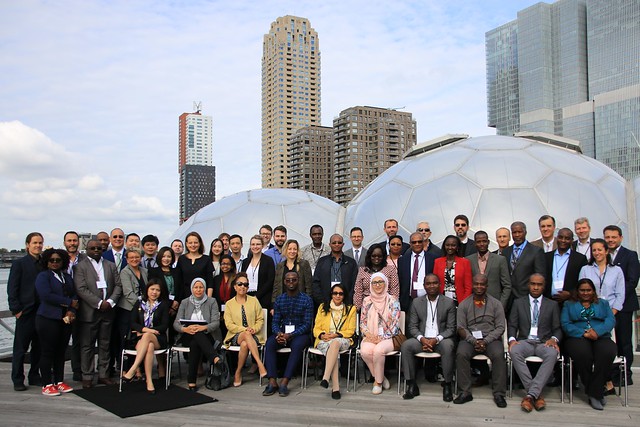Introduction
Over 50 representatives from 12 countries came together in Rotterdam, the Netherlands, to discuss how developing country governments can engage businesses and investors in the development and implementation of their National Adaptation Planning (NAP) processes.
Hosted by the NAP Global Network, with support from the Government of the Netherlands, the objectives of this Peer Learning Summit were for participants to:
- Identify and share country experiences and enabling factors for private sector engagement in the NAP process.
- Identify needs and gaps for government action from the perspective of private sector actors in key priority sectors such as tourism and agriculture, in order to facilitate their engagement in NAP processes.
- Reflect on the role that donors and climate support initiatives can play in fostering greater private sector engagement in NAP processes.
Countries in attendance included Ghana, Saint Lucia, Rwanda, Morocco, Vietnam, Brazil, Colombia, Jamaica, Côte d’Ivoire, Kenya, Sierra Leone and Jordan, as well as a range of bilateral development partner agencies and international climate support initiatives.
Unavoidable carbon emissions for this event were offset through UNFCCC’s Climate Neutral Now initiative.
Check out our Flickr album from the Peer Learning Summit
To learn more about this topic:
- Read the NAP Global Network’s guidance note, Engaging the Private Sector in National Adaptation Planning Processes.
- Follow our five-part blog series, with a new blog each week in the lead-up to this event:
- Part I: What is the Business Case for Private Investment in the NAP Process?
- Part II: Knowledge is Power: Why information sharing is key to engaging businesses in the NAP process
- Part III: Paying for it: How governments can help the private sector overcome financial barriers to investing in adaptation
- Part IV: For MSME Day, We Look at How Institutional Arrangements Can Engage Small Businesses in Climate Adaptation
- Part V: When Life Gives You Lemons: How to bolster businesses’ capacity for making lemonade out of a changing climate
July 9
Watch our video on engaging the private sector in the NAP process
Introduction to the NAP Global Network | Christian Ledwell, IISD
Engaging the Private Sector in NAP Processes | Alec Crawford, IISD
Enabling Factors, Part I, Information sharing | Clare Church, IISD
Sowarthe Tea Factory Rwanda | Rohith Peiris, Sowarthe Tea Factory Rwanda
Enabling Factors, Part II, Institutional arrangements | Clare Church, IISD
Kenya Public-Private Coordination and Best Practices | Faith Ngige, Kenya Private Sector Alliance
Ghana’s Experience with Private Sector Engagement | Dr. Antwi-Boasiako Amoah, Ghana’s Environmental Protection Agency
Red Stripe: We Take the Lead - Institutional Arrangements | Dianne Ashton-Smith, Red Stripe Brewery
Climate Action Enhancement Package | Dr. Romeo Bertolini, NDC Partnership, and Pieter Copper, Government of Netherlands
July 10
Enabling Factors, Part III, Capacity building | Lena Klockemann, GIZ
Capacity Building | Nelson Ananias Filho, Brazilian Confederation of Agriculture and Livestock (CNA)
Enabling Factors, Part IV, Financing | Alec Crawford, IISD
Financing for Adaptation Actions | Carlos Casallas Acero, Finagro Colombia
Building Climate Resilient Value Chains | Delphine Clement and Philippe Alléau, International Trade Centre
July 11
Accelerating Adaptation | Richard Klein and Michel van Winden, Global Center on Adaptation
Green Climate Fund Master Class Session | Fumihiko Tominaga, Green Climate Fund
Identifying Climate Change Business Opportunities | Na-Hyeon Shin, GIZ
Driving Finance Today for the Climate Resilient Society of Tomorrow | Alan Miller and Andrew Eil, Climate Finance Advisors
Read Driving Finance Today for the Climate Resilient Society of Tomorrow, a report prepared by Climate Finance Advisors for the United Nations Environment Programme Finance Initiative (UNEP FI) and the Global Commission on Adaptation (GCA) as a contribution to a series of technical background papers on finance for adaptation and resilience supporting the GCA’s inaugural flagship report scheduled for September 2019.
